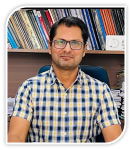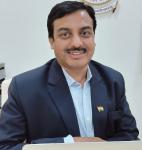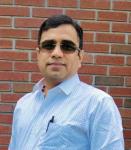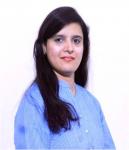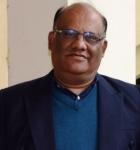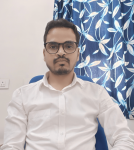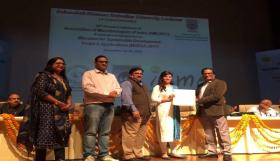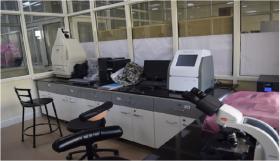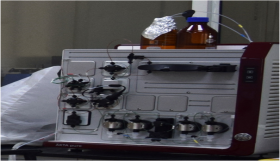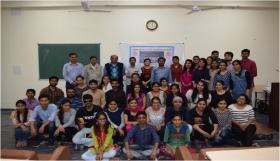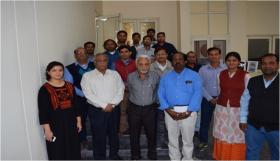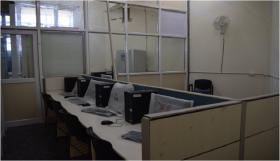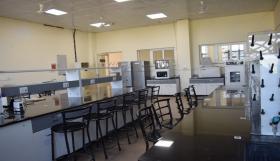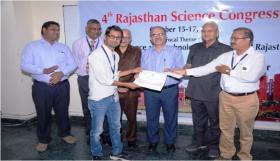In addition to the central instrumentation facility of the department of microbiolgy there are number of research laboratories according to the expertise of the faculties in the department. Details of these research labs are given below:
1. Bioprocess and Bioenergy Laboratory:
Group Leader: Prof. Pradeep Verma
Area of Research: Microbial Biodiversity, bioprocess development, enzymology, biomass and bioenergy, microbial fuel cell technology and algal biofuel.
The laboratory focuses on developing scientific process and technologies to produce various economically important products such as enzymes, metabolites and biofuels. The Laboratory works broadly on three major areas:
- Study of microbial diversity of various ecological niches.
- Bioprocess development for production of biotechnologically important products.
- Development of efficient biomass pretreatment system for cost effective production of bioethanol and other value added products.
Bioprocess and bioenergy laboratory has collaboration with various national/international research organizations. The laboratory has completed two national collaborated projects of worth 152 lakhs, funded with grants from DBT.
Major Research Facilities available: Microwave digestor System; Rotatory Evaporator; Bioreactor; Incubator Shaker; Incubator; Hot Air Oven; Water Bath; Horizontal and Vertical Gel Electrophoresis; Tissue culture Rack; Autoclave; -20 Deep Freezer; Refrigerator; Single Distillation Unit
Research Staff: 03 PhD Scholars
Research Output (Last 3 Years): 08 Research Paper; 02 Book Chapter; 16 Presentations at different Scientific meetings at the national and international levels.
Important Links: http://www.vermapradeep-lab.com/
2. Microbial Diversity, CyanoTech and CyanoTox Laboratory:
Group Leader: Prof. (Dr.) Pawan K. Dadheech
Research areas: Microbial Diversity; Bioprospecting of Extremophilic microorganisms; Cyanobacterial toxins; Cyanobacterial Biotechnology.
Facilities: ELISA reader, Thermocycler, Culture racks for cyanobacteria and micro-algae, Laminar air flow, Deep freezer, etc.
3. Public Health Genomics Laboratory
Group Leader: Dr. Arvind P. Singh
Research Areas:
- Assessing the functions of antimicrobials in animal agriculture: To know the level of antimicrobial resistance in foodborne bacteria from the food-animals origin is essential for regulating the safe use of antibiotics in animal agriculture, which in turn lead to our ability to combat the problem of antimicrobial resistance as well as to fight bacterial infectious diseases.
- Understanding the ecology and behaviors of enteric bacterial pathogens in plants: What are the phenotypic and genetic factors that influence the survival of enteric pathogens in plants, are the top questions that we are addressing to reduce the risks of foodborne illness linked with contaminated raw agricultural produce.
- Developing microbiome-based therapeutic targets: Considering the importance of human gut microbiome in medicine, we are exploring the microbiota of cow which may yield advance knowledge for new insights into the therapeutic potential.
4. Energy and Environment Research Laboratory (EERL)
Group Leader: Dr. Akhil Agrawal
Dr. Akhil Agrawal is currently working as Assistant Professor in the Department of Microbiology and is team leader of EERL. As on 2018, he has more than eight years of research experience in Petroleum Microbiology. He team consist of 4 doctoral students, JRFs, field assistants and PG and UG students. The cummulative effort of everyone has lead to the more than 20 research articles and chapters in reputed journal. Dr. Agrawal is cuurently working on pertigious IMPRINT2, DBT-Twining, DST-ECRA and DST-Rajasthan projects with more than 2.5 crores of research funding. He has several industrial (ONGC, OIL Assam and Cairn India Ltd) and international (University of Calgary, University of Toronto) colloaborations. He holds a patent in the field of MEOR and currently developing a BcEOR technology for Oil fields of India. More information about his work and current positions is available on weblink: https://akhilagrawal-eerl.webs.com/
Expertise and Research interests:
(a)Petroleum Microbiology: Reservoir Souring control and Microbial Enhanced Oil Recovery
(b) Cyanobacterial Biotechnology: Development of natural sunscreens
Facilities: Anaerobic Culture Facility; Oil field simulating bioreactor facility; Cyanobacteria culture and induction facility
5. Biocatalysis and Bioprocess Laboratory
Group Leader: Dr. Nidhi Pareek
Dr. Nidhi Pareek has established Biocatalysis and Bioprocess Laboratory at Department of Microbiology, School of Life Sciences, Central University of Rajasthan with the help of INR 51 lakhs grant received from DBT and DST, Govt. of India. Currently, the group has 02 doctoral students and guided 11 post-graduate and 6 graduate student research projects. The post-graduate students are now pursuing their doctoral studies at various premier research institutions viz. IIT Guwahati, Guwahati; CSIR-IMMT, Bhubaneswar; KGMC, Lucknow. Some of the post-graduate students are well placed at Pharmaceutical industries. The research efforts of the group to date have led to publication of 27 refereed papers and 03 book chapter along with and 21 research presentations at professional meetings at the regional, national and international levels.
Research Area: Microbial Biotechnology, Bioprocess development, Microbial Proteomics, Bioenergy
Research focus:
- Sustainable production of chitin derivatives through highly efficient biocatalytic conversion.
- Better utilization of chitin from biomass processing.
- Providing an integrated view for production of well-defined COS in terms of degree of polymerization and acetylation sequence along with the applications.
- Integrated remediation of industrial effluents employing photoautotrophs (microalgae, cyanobacteria) and bioenergy generation
6. Microbial Hydrometallurgy Laboratory
Group Leader: Dr. Chandra Sekhar Gahan
The Microbial hydrometallurgy Laboratory in the leadership of Dr. Chandra Sekhar Gahan is currently working on microbial aided metal extraction from various industrial and electronic wastes such as waste mobile phone printed circuit boards, petroleum refinery spent catalysts and copper slag, steel slag etc. Apart from the waste, the research lab also carries out research on metal recovery process optimization of various sulphide ores and concentrates of copper, gold, zinc etc. Laboratory is equipped with Instrumentation facilities like Atomic Absorption Spectroscopy, muffled furnace, Visible Spectrophotometer, vortex mixer, compound Microscope, Oxidation Reduction Potential (ORP) meter etc. The process engineering set up comprises of 4 Chemical/bioreactor with a volume of 2-5 Litres with overhead stirrer for homogenous mixing and hot plate at the bottom of the reactor for temperature control. The laboratory has been functional with the help of external research grant of 25.9 Lakhs from Department of Science and Technology (DST). At present two Ph.D. students are pursuing their research under the guidance of Dr. Gahan and have published 3 Research articles in peer reviewed International Journal after joining this University. The Broad research areas of this laboratory are Biohydrometallurgy, Bioprocess engineering of chemolithotrophic acidophiles, Industrial waste recycling, E-waste Recycling, Metal recovery and process optimization.
Broad Research Area: Bioleaching, Biosorption, Bioprocess Engineering
7. Dr. Deeksha Tripathi’s Laboratory:
Tuberculosis is still a formidable challenge, causing nearly about two million deaths each year. The causative agent of the disease, Mycobacterium tuberculosis, is a highly flourishing intracellular pathogen. At present, the only vaccine against TB is live M. bovis, bacilli Calmette Guerin (BCG). It is however only effective in preventing the disease in children and does not confer protection against disease in adulthood or during reactivation of latent cases. As a consequence, persistent efforts are required for new TB vaccines and drug development.
Our research laboratory is interested in development of new immunotherapeutic interventions and vaccine candidates to combat tuberculosis. Our research is deciphering the molecular processes regulated by the pathogen to survive in hostile host environment.
8. Cell Molecular Biology of Infectious Diseases Laboratory (CMBID)
Principal Investigator: Dr. Vijay K. Verma
Infectious diseases still cause a threat at a global and local level, particularly as disease agents can evolve so quickly. For example, bacteria such as Helicobacter pylori, Mycobacterium tuberculosis causes infections that can have devastating consequences particularly in developing countries and they also show resistance to many antibiotics. To eradicate these deadly pathogens, we first need to focus on phenomenon which helps these bacteria to survive in host that is persistent infection.
Dr. Vijay Verma has started to establish Cell Molecular Biology of Infectious diseases laboratory at Department of Microbiology, School of Life Sciences, Central University of Rajasthan by using DST Inspire and UGC Start-Up grant. The research laboratory is exploring the different mechanism by which these bacteria escape the host’s natural immune systems and reside in host for a long time (persistent infection).
Research Area: Molecular Biology of Host-Pathogen Interactions, Phase Variation and Persistent Infection, Biofilm formation, DNA uptake machinery and Host Immune Evasion.

